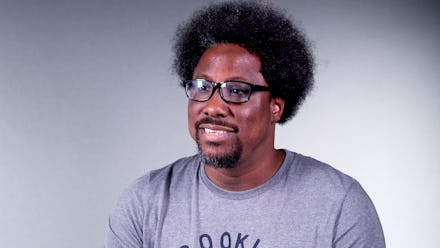W. Kamau Bell shares how his afro is part of his identity — and the journey it took to understand it

Sociopolitical comedian W. Kamau Bell has some thoughts on the current state of men’s hair across America. He shared them — and how his own identity as a cisgender black man helped inform decisions around how he styled his hair growing up — during a recent visit to Mic’s offices.
Bell, who is best known for his Emmy-winning CNN show United Shades of America as well as his Showtime comedy special Semi-Prominent Negro, is not one to typically opine on follicles — yet it’s a subject the implications of which are seen and heard throughout much of his work. In fact, he dedicated an entire segment of his comedy special to discussing the unique dynamic of having a mixed-race daughter and navigating the ensuing conversations around her hair.
But his own hair? That’s a newer point of discussion. Or it was until he was approached by Dove Men+Care, who earlier in 2017 commissioned what they call a “hair census” in which they surveyed a diverse group of 2,000 U.S. men aged 25 to 55 from all 50 states. They brought on Bell — a man who, it turns out, has a lot to say when it comes to his hair — as a spokesperson.
“I like to always quote the great Jim Morrison, ‘Some of my worst decisions have been haircuts,’” Bell said with a laugh. “So the barbershop was a pretty intense place when I was a kid. I felt like I got the haircut my dad wanted me to have. And so I would go there, and I would sort of sit down in the chair and ... at the end [I would] be finished and be like, ‘I guess that’s the haircut I’m getting today.’
“And so it was really, there was a style of hair that I was being made to be a part of. And so there wasn’t a sense of ‘How do you want your hair?’ And it wasn’t until I hit high school that I started to think about, ‘Well, how do I want my hair?’”
Turns out, he’s far from alone. Eighty-six percent of men Dove Men+Care polled felt their hair was a reflection of their personal style and identity. And as black men, there’s an increased frequency in how often their hair is styled. More than half of all black men surveyed — 52%, in fact — cut their hair at least every other week. It’s a conversation Bell says was quelled as a child.
“In my community, I was not raised to talk about my feelings,” Bell said. “I was very sensitive as a kid and I’m still very sensitive. I was raised to sort of not cry so much and keep that in, and therefore you’re not even vulnerable to [be] like, ‘Man, that guy’s got good hair. I really want to talk to him about his hair.’ And there’s also just a lot of stigma among heterosexual men about things that appear to be gay.”
It wasn’t until adulthood that Bell learned silence allows stigmas like that to pervade. These days, rather than having only the Jacksons and Dr. J as hair inspo — as Bell did in childhood — there’s a wider net of black male hairstyles reflected in the media.
“Now they’re everywhere,” Bell said. “I don’t feel like there’s just a couple of us anymore.” But while representation might be more plentiful, it’s increased conversation Bell hopes to awaken. “I would like to see the same amount of familiarity and access that women are encouraged to have with their entire vanity.”
Watch the full interview below: